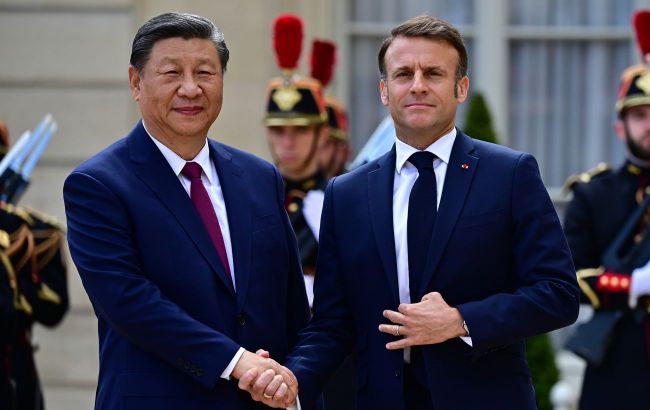Xi Jinping seeks to drive wedge between EU and US during his visit to Europe - Bloomberg
 Archive photo: Xi Jinping and Emmanuel Macron (Getty Images)
Archive photo: Xi Jinping and Emmanuel Macron (Getty Images)
During his visit to Europe, Chinese leader Xi Jinping tried to divide the continent and drive a wedge between the United States and the EU, according to Bloomberg.
The agency points out that Xi Jinping's visit to France did not bring the expected result, but his visits to Serbia and Hungary were more productive.
"Although Xi talked about avoiding a "new Cold War", his diplomacy has revived the divisions of the last one by pitting Europe’s east against west," Bloomberg reports.
China's leader wanted to drive a wedge between the US and the EU
Macron hoped that by establishing closer personal ties, he could persuade the Chinese leader to influence Vladimir Putin to end Russia's war against Ukraine. However, Xi did not change China's position much.
European Commission President Ursula von der Leyen also emphasized the existential nature of the war, but Xi Jinping tried to push back and urged not to criticize China over the war in Ukraine.
Bloomberg writes that Xi may have hoped to drive a wedge between the US and the European Union, but it's unlikely he succeeded. Ursula von der Leyen later said that the EU was ready to use all available tools to counter China's unfair trade practices.
Contacts with Hungary
During his visit to Hungary, Xi Jinping announced a number of new investments in the country. At the same time, he tried to demonstrate that Hungary serves as an example of the relations that could exist between the European Union and China.
The agency notes that the Hungarian government lacks funding, so the country is trying to find new stimuli for its economy by any means.
According to Hungarian Minister of Foreign Affairs Peter Szijjarto, the agreements signed with China include money for the expensive modernization of the country's old railroad network and the construction of a long-delayed connection between Budapest Airport and the city center. Hungary will also seek to deepen cooperation with Huawei to advance digitalization in the country.
At the same time, journalists clarify that this is not China's first attempt to divide the EU. In 2012, Beijing created a mechanism to strengthen ties with 16 countries in Central and Eastern Europe, but this initiative later collapsed.
Xi Jinping's position on the war in Ukraine
The Chinese leader did not condemn Russia, but instead deepened ties between the countries after Russia's invasion of Ukraine. However, Xi Jinping advocates for a swift end to war. To achieve this, China has worked out its peace plan.
Yesterday, Hungarian Prime Minister Viktor Orban said after a meeting with Xi Jinping that his country supported China's peace plan to end the war in Ukraine.


